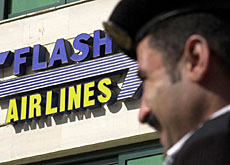Egyptian crash carrier’s fleet had “serious faults”

Switzerland’s aviation authorities say they found serious faults on both planes owned by the Egyptian carrier, Flash Airlines, over a year before one of its planes crashed.
But the Federal Office for Civil Aviation (FOCA) said it was drawing no conclusions about Saturday’s crash, which killed all 148 people on board.
The agency said in a statement it had found a number of defects on both aircraft, including missing navigational documents, fuel calculations that didn’t match international standards and unsuitable emergency exit signs.
“In addition, obvious maintenance deficiencies were found in the areas of the landing gear, the engines and the aircraft steering,” the statement added.
A Flash Airlines Boeing 737 crashed into the Red Sea on Saturday shortly after take-off from the Egyptian resort of Sharm El-Sheikh. Most of the passengers were French.
Egyptian officials say the crash appears to have been caused by a technical problem.
Flight ban
One aircraft was inspected in Switzerland in April 2002, while the other was examined in October the same year. Inspectors found similar faults on both aircraft.
Flash Airlines only operated two commercial jets during 2002.
The Swiss agency wrote to the carrier after the first inspection, insisting that these faults be rectified before its next flight to Switzerland.
Celestine Perissinotto of FOCA said officials received no reply from Flash Airlines.
FOCA decided to ban all Flash Airlines flights from Swiss airspace after the carrier failed to provide sufficient proof that the defects had been remedied.
After the second plane was checked in October 2002, the agency wrote to the Egyptian authorities, informing them of its decision.
It also told the head of the European aviation inspection programme that Flash Airlines was banned from landing in Switzerland.
Financial dispute
Mohammed Nour, chairman of Flash Airlines, said on Sunday that the Swiss ban was due to a financial dispute rather than safety concerns.
The French transport minister, Gilles de Robien, said France had carried out three checks on Flash aircraft following the Swiss report before deciding the fleet was fit to fly.
Meanwhile, Germany’s civil aviation authorities have put Flash Airlines’ flying rights under review as a precautionary measure in the light of Saturday’s crash.
The Egyptian civil aviation ministry said on Sunday that all aircraft were subject to regular inspections according to international rules and regulations.
Max Friedli, interim director of FOCA, told Swiss television on Monday that 23 aircraft from different airlines were currently banned from using Swiss airports.
Friedli refused to name the firms concerned, citing a “gentleman’s agreement”.
swissinfo with agencies
The faults included missing navigational documents, fuel calculations that didn’t match international standards, and unsuitable emergency exit signs.
One craft was inspected in April 2002, while the other was examined in October the same year.
Similar faults were found on both of Flash Airlines’ planes.
Since October 2002, Flash Airlines’ planes have been banned from Swiss airspace.
Authorities say 23 other airplanes from different airlines are also banned from Swiss airspace.

In compliance with the JTI standards
More: SWI swissinfo.ch certified by the Journalism Trust Initiative
You can find an overview of ongoing debates with our journalists here. Please join us!
If you want to start a conversation about a topic raised in this article or want to report factual errors, email us at english@swissinfo.ch.